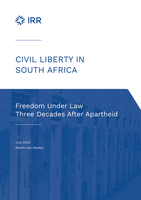
Report briefing recording:
The South African Constitution has been called one of the ‘most liberal’ constitutions in the world, and to a large degree its text reflects this concern with civil liberty that was absent during the country’s Apartheid years before 1994.
For much of human history, the freedom of the ordinary individual was not a legally protected phenomenon. Freedom was a factual question: if the political authorities did not take an interest in someone, they had freedom. If the authorities did take an interest in someone, they lost that freedom and had little recourse, unless they had the raw power to resist. This changed around the time of the Enlightenment, when it was realised that individual freedom and constitutionally limited government was a crucial aspect of a well-functioning society and economy. ‘Liberty’ then became the legal institution known today as ‘civil liberty’ – or ‘freedom under law’.
In terms of the ‘social contract’ that came to be recognised at this time, government’s raison d'être in society is to protect the civil liberty of legal subjects.
During the Apartheid years civil liberty was recognised only in the common law, which Parliament could, legally, and did, practically, override with legislation. This changed fundamentally in 1994 with the adoption of the interim Constitution, and in 1996 with the adoption of the current Constitution. Civil liberty was elevated to constitutional law, coming under the direct protection of higher-order law and the courts.
In particular, section 36 of the Constitution, which provides the formula that government and the courts must apply to determine whether a contemplated limitation of the civil liberties entrenched in the Bill of Rights is justifiable, is key to the effective protection of freedom under law. This provision has however been misconstrued, with the courts and commentators understanding it not as a mechanism for the protection of constitutional rights, but rather a mechanism government may employ to violate them.
Over and above this constitutional institution, Parliament and the executive government have since 1994 engaged in various efforts to undermine civil liberty – sometimes employing section 36, often not – including, most recently, a desire to adopt the Expropriation Bill and the Hate Speech Bill. These laws alone would represent significant and unjustifiable incursions on freedom under law in South Africa.
In this paper, Martin van Staden explains the foundations of civil liberty, considers South Africa’s track-record since 1994, and provides recommendations for how the courts, Parliament, and the executive can place civil liberty in its proper, elevated constitutional position. The courts, Van Staden recommends, should adopt a new approach to section 36 that respects that provision’s logic. Parliament should adopt a package of legislation that recognises and safeguards various dimensions of freedom under law. And the executive must instil a culture of respect for civil liberty among the civil service, as, after all, the protection – not violation – of civil liberty is government’s ultimate social purpose.
